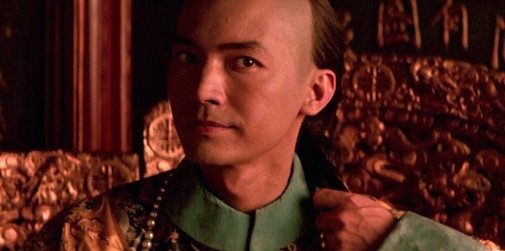
Parasite made history by becoming the first non-English-language production to win the Best Picture Oscar. Its many victories marked a series of firsts for the Academy, but there's a couple of feats that Bong Joon-ho's masterpiece shares with other winners. As it happens, Parasite is the third film with a majority Asian cast to conquer Best Picture. The Last Emperor and Slumdog Millionaire are the other two. Another thing they share is a glaring lack of acting nominations, which is rare for Best Picture champions. It's difficult to peruse the data and not smell a whiff of systematic racism.
John Lone's absence from the Oscar line-up for his starring role in The Last Emperor is particularly odd…

Regarding 1987's Oscar race, Michael Douglas (Wall Street), Jack Nicholson (Ironweed) and William Hurt (Broadcast News) were probably givens considering the performances and/or Oscar's history with those men. Robin Williams (Good Morning Vietnam), in pursuit of his first nomination, and Marcello Mastroianni (Dark Eyes), in pursuit of his last, weren't so set in stone. The Italian thespian feels like a particularly bizarre inclusion. Nikita Mikhalkov's Dark Eyes is an Italian-Soviet coproduction based on a Chekhov story, an eccentric opus with an equally eccentric performance at its center. Painted in shades of clownishness and melancholic sorrow, Mastroianni's work is admirable, but the nomination is a strange one nonetheless.
Apart from a Cannes prize, he got no attention from precursors and, considering the film received only one nomination, it isn't as if the Academy was in love with Dark Eyes. Certainly not to the extent they were enamored by The Last Emperor with its clean sweep of victories (9 nominations & 9 wins). What's more Lone had nabbed a well-deserved Golden Globe nomination and the role of Emperor Pu Yi is the juiciest sort of Oscar bait imaginable. He's the leading man of a lavish biopic whose story weaves through some of the most important chapters of 20th-century history, including World War II. Even better, the film's narrative demanded that Lone play the deposed monarch across decades, wearing extensive makeup to transform him into the aging Pu Yi.

For his part, John Lone tackles the challenge of such a role with gusto.
When we meet him, Lone's disgraced ruler is a middle-aged prisoner of the Communist regime. Sullen faced and grim, he's a lost soul trying to kill himself to avoid the indignities of a life imprisoned. Not that he wasn't familiar with the feeling, one must say. If there's a single through-line to the portrait of Pu Yi, it's his almost pathological pursuit of freedom. Since he was taken from his mother's arms at the age of two and enclosed in the Forbidden City, crowned China's Emperor, he was a man incarcerated by obscene privilege.

As a child, Pu Yi was taught to see himself a God on Earth, a supposedly all-powerful being with total control over hordes of eunuch slaves. Despite this, he was also chained by protocol and the demands of the Dragon Throne, growing deprived of discipline or familial warmth. His identity was quickly denied, for he had to be a symbol existing above our mortal plane. That is until he was deposed at the age of six, a fact that was hidden from him for many years. Living a life so misshapen by ancient traditions and the violent tides of History, he evolved into a cold man, prone to bouts of cruelty, ambition, and blind to the needs of others and desperate to assert himself.

These dimensions aren’t made explicit by the screenplay. For all its epic proportions, The Last Emperor functions as a character study marked by conflicted feelings towards its main subject. It's Lone's job to fill in the blanks, building a character made out of masks and repressed feelings without contradicting the narrative's built-in ambivalence. The actor does this with formidable tonal plasticity, jumping from register to register as a veteran of the social theatre. He can go from detached to charming, from expressionless authority to tightly-wound impotent rage in the blink of an eye. Give him a speech and he'll shine like a good political puppet, give him a song and he's a matinée idol worthy of the silver screen.

It's when nobody is looking that Pu Yi must improvise being himself. Then, a brittle sort of emptiness overcomes him. Lone illustrates this with a disciplined control over his face and dominion over the expressiveness of his body. Even in prisoner garb and sallow, there's a glimmer of arrogance in his eye and nobility to the way he carries himself. In wide shots, filmed from the back amidst a crowd, Pu Yi is always identifiable thanks to the way John Lone delineates his characteristic physicality. As the years pass, the actor lets this glacial presence melt away, loosening up as the body deteriorates and the emperor finds himself reduced to an anonymous gardener.

In his last moments, the actor still manages to surprise us one more time. It's with a flash of giddiness and the smile of a kid showing another child a secret treasure. Such wonders were certainly worthy of an Oscar nomination.
Previously in this series
- Lana Turner in The Bad and the Beautiful (1955)
- Michelle Yeoh and Zhang Ziyi in Crouching Tiger (2000)
- Kate Winslet in Revolutionary Road (2008)
- Tilda Swinton in We Need to Talk About Kevin (2011)
- Emma Thompson in Saving Mr Banks (2013)
- Jennifer Lopez in Hustlers (2019)